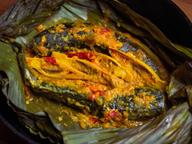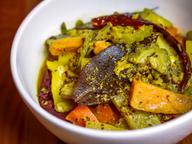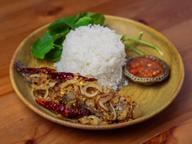gluten-free
Sambal tempoyak daun kayu
Thinly sliced daun kayu or cassava shoots cooked in tempoyak is a classic Negeri Sembilan dish.
Tempoyak ikan patin
Fermented durian gives this classic Pahang dish a rich taste and heady aroma.
Tempoyak
Make your own tempoyak with just durian flesh, salt, and time.
Deep-fried okra
Revive dry, stale okra by deep-frying it until crunchy and supremely snack-able.
Kari kaja’ siyok (chicken feet curry)
A Dayak chicken curry made with an often-overlooked off-cut: chicken feet.
Chicken pineapple curry
We’ve been putting fruits in savoury dishes for ages in this part of the world, such as this chicken curry which gets a tangy boost from pineapple.
Huan chu heok masak lemak
A Nyonya classic that uses sweet potato and its leaves in one luxurious dish.
Singgang
Make this singgang with extra soup to sip on slowly when you’re under the weather.
Tebaloi (Coconut-sago crackers)
A perfect not-too-sweet snack to add to your array of CNY treats.
Mochai karuvadu kuzhambu (Field beans & salted fish curry)
A deeply savoury curry found in many South Indian and Ceylonese homes.
Indian-spiced tofu
Give tofu some extra love with a healthy dose of warm spices and plenty of complementary textures.
Pinarasakan sada bambangan (Braised fish with wild mango)
When bambangan season rolls around, this braised fish is a delicious way to use up a glut of the fruit’s harvest.
Steamed fish with onion-garlic oil
Low-stakes steamed fish to get you accustomed to making this favourite at home.
Roast chicken with orange, tamarind & cumin
A festive roast chicken seasoned with local and easily attainable ingredients.
Green beans poriyal
A quick vegetable stir-fry with the classic savoury spices of an Indian kitchen.
Mutton varuval
A deep, dark, complex mutton dish to impress your guests on festive occasions.
Stir-fried kangkung with budu
A spicy and savoury vegetable side for the dinner table, with budu as the star.
Spicy egg sambal
An any-meal sambal-scramble that can be stored in the fridge for busy days.
Orh oh bak (Yam and pork in soy sauce)
A Hakka homestyle dish that became an instant classic in Zara’s home.
Hu chee rumpah (Sambal-stuffed fried fish)
Sambal-stuffed fish is a highlight at many nasi campur stalls; you can now make it at home.
Lemon basil sambal
A herby sambal to accompany daily meals, especially when paired with fried meats and more ulam.
Singapore mee siam
A dish with many styles, this variation amps up the savoury kick with a lot of taucu and kucai.
Char swee (Stir-fried cucumber in vinegar)
Cooking cucumbers isn’t a novel method. This excellent Nyonya recipe shows us a tangy application for weeknight meals.
Winged bean kerabu
Make this simple vegetable side dish without even turning on the stove.
Herby chicken liver pâté
Bring chicken liver pâté to Malaysia by infusing it with the hallmark flavours of the region.
Mrs Menon’s mango curry
A sweet introduction to the world of fruit curries, this mango curry is perfect for an Onam Sadhya lunch.
Braised turmeric chicken
When you want ayam kunyit but can’t bear the oily cleanup, turn to this braise instead.
Sardine sambal
Wonder why sardine sambal isn’t up your alley? Try this pre-frying technique and let us change your mind.
Black pepper meehoon
Fiery black pepper meets silky meehoon in this quick meal, perfect for when you want a homemade meal—fast.
Bosou sada
Ferment your fishing trip catch with this method, and enjoy a uniquely Kadazandusun flavour while you’re at it.
Stir-fried cabbage with almond flakes
Swap out the usual stir-fry aromatics for fragrant and crunchy almond flakes instead.
Yellow chicken gulai
Chicken and coconut milk come together in a simple preparation of gulai kuning or masak lemak, perfect for a quick yet satisfying meal.
Sambal tempra
A base Eurasian sambal for many dishes such as prawn or ikan sambal, and sambal petai.
Aloo mutton keema
A versatile minced meat sauce that can be paired with your carb of choice for a complete meal or even a quick snack.
Yam chicken
The kind of homestyle weeknight braise you probably won’t find in a restaurant.
Terung Dayak with mackerel
This dish is a common staple on Diana’s family dining table, as her mom would buy terung Dayak whenever they were in season.
Banana heart kerabu
Rather than raw, this kerabu includes cooked elements that result in something like a masak lemak.
Sweet mango chutney
Unlike many other chutneys popular in the Malaysian-Indian repertoire, this one veers sweet and makes for a great snack on its own.
Thai-style bihun salad
A wonderfully savoury salad for a crowd, perfect for potlucks, parties, and picnics.
Fried rendang
Soft and tender chunks of meat without hours on the stove is not possible, but getting those spicy rendang flavours definitely is.
Creamy spicy chicken curry
This version of Malaysian-Indian chicken curry uses store-bought curry powder such as Baba’s, but is taken up a notch with extra spices.
Pulut kacau
Pulut kacau or wajik can be made at home as a gift for the neighbourhood.
Acar hu
This Nyonya-style fish pickle ticks all the tasty flavour boxes: tangy, fatty, savoury, sweet.
Umbut sawit in belacan
Umbut sawit is the young shoot or heart of the oil palm tree. Plentiful in Borneo from the plantations, resourceful locals have found that it makes for a terrific ingredient.
Paeh ikan keli
The Temuan way to cook this fish is over the embers of an outdoor stove. We highly encourage you to go for it if you have a grill.
Ayam asam rong
This is a traditional recipe originating from Jerantut, Pahang, and has since spread to neighbouring areas in the state.
Orh nee / 芋泥 / Yam paste
Consumed as a dessert, the serving of orh nee marks the end of a traditional multi-course Teochew banquet.
Gaeng som
This dish, inherited from Banyen’s late grandmother, makes an appearance at least twice a week on their dinner table at home.
Ponggal rice
Made with fresh rice of the first harvest at the end of the winter solstice, this is offered to gods & goddesses before family & friends.
Shukto
Leela’s late mother was the family’s ‘culinary comforter’, and taught her how to make this vegetable dish. Complex in flavour, this recipe takes no shortcuts.
Horlicks flan
A dessert containing eggs, milk and Horlicks means it’s okay to eat for breakfast, right?
Pekasam ikan
Many kampung folks catch freshwater fish as a cheap source of protein, and pekasam is a way of fermenting a glut of a catch.
Kangkung belacan
This is quite possibly the best version of kangkung belacan we’ve tried—spicy, briny and still-crunchy.
Hinava tenggiri
Hinava is a traditional native dish of the Kadazandusun people in the state of Sabah, which is a method of cooking saltwater or freshwater fish using lime juice.
Fenugreek fish sambal
The star of this dish is fenugreek, along with the freshest fish possible.
Chicken lihing soup
Natasha learned how to make this dish from her mother (who she assumes learned it from her mother), and craves it on gloomy rainy days.
























































